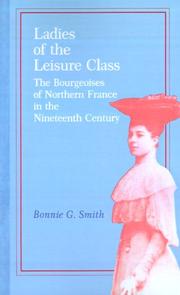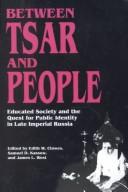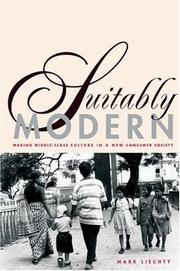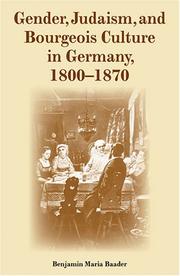| Listing 1 - 4 of 4 |
Sort by
|

ISBN: 0691101213 0691053308 Year: 1981 Publisher: Princeton, N.J. : Princeton University Press,
Abstract | Keywords | Export | Availability | Bookmark
 Loading...
Loading...Choose an application
- Reference Manager
- EndNote
- RefWorks (Direct export to RefWorks)
In a social and cultural study of nineteenth-century bourgeois women in northern France, Bonnie Smith shows how the advent of industrialization removed women from the productive activity of the middle class and confined them to a largely reproductive experience. Out of this, she suggests, they created their own world, centered on domesticity, family, and religion. To understand these women, the author argues, it is necessary to examine their world on its own terms as a coherent whole.Professor Smith draws on demographic, psychoanalytic, anthropological, linguistic, as well as historical insights and uses a variety of evidence that includes personal interviews, photographs, letters, genealogical records, and traditional archival sources. Part One outlines the transition from mercantile to industrial manufacturing that terminated the relationship between home and business and that separated the sexes according to their respective functions. Part Two concentrates on the lives of the women following their acceptance of an exclusively reproductive function and shows how the interdependence and fusion of household chores, religious values, and social conscience fostered a unified cultural system. Part Three, then, explores the propagation of this domesticity by the convent, as the primary educational system, and by the sentimental novel, as the vehicle most suited for an ideological expression of domestic life.
History of civilization --- anno 1800-1899 --- France: North --- Middle class women --- Middle class --- Femmes des classes moyennes --- Classes moyennes --- History --- Histoire --- -Middle class women --- -Women --- Bourgeoisie --- Commons (Social order) --- Middle classes --- Social classes --- -History --- -Social conditions --- -Middle class --- Women --- Social conditions

ISBN: 0691008515 0691031533 Year: 1991 Publisher: Princeton : Princeton University Press,
Abstract | Keywords | Export | Availability | Bookmark
 Loading...
Loading...Choose an application
- Reference Manager
- EndNote
- RefWorks (Direct export to RefWorks)
This interdisciplinary collection of essays on the social and cultural life of late imperial Russia describes the struggle of new elites to take up a "middle position" in society--between tsar and people. During this period autonomous social and cultural institutions, pluralistic political life, and a dynamic economy all seemed to be emerging: Russia was experiencing a sense of social possibility akin to that which Gorbachev wishes to reanimate in the Soviet Union. But then, as now, diversity had as its price the potential for political disorder and social dissolution. Analyzing the attempt of educated Russians to forge new identities, this book reveals the social, cultural, and regional fragmentation of the times. The contributors are Harley Balzer, John E. Bowlt, Joseph Bradley, William C. Brumfield, Edith W. Clowes, James M. Curtis, Ben Eklof, Gregory L. Freeze, Abbott Gleason, Samuel D. Kassow, Mary Louise Loe, Louise McReynolds, Sidney Monas, John O. Norman, Daniel T. Orlovsky, Thomas C. Owen, Alfred Rieber, Bernice G. Rosenthal, Christine Ruane, Charles E. Timberlake, William Wagner, and James L. West. Samuel D. Kassow has written a conclusion to the volume.
Intellectuals --- Middle class --- Intellectuels --- Classes moyennes --- History --- Histoire --- Russia --- URSS --- Russie --- Intellectual life --- Vie intellectuelle --- bourgeoisie (classe sociale) --- Élite (sciences sociales) --- vie intellectuelle --- 1917 --- Conditions sociales --- Acmeism. --- Bolshevism. --- Bulgakov, S. --- Café Pittoresque. --- Decembrists. --- Economic Discussions. --- Education Statute (1874). --- Free Economic Society. --- Free Russian Press. --- Gagarin family. --- Gilded Age, in Russia. --- Hobsbawm, E. --- Holy Synod. --- Jewish writers. --- Kantianism. --- Kornilov Affair. --- Luxemburg, R. --- Menshevism. --- Ministry of Internal Affairs. --- Moscow Legal Society. --- Peredvizhniki. --- aesthetism. --- agronomy. --- aristocracy. --- art patronage. --- autocracy. --- bureaucracy. --- business. --- cabarets. --- class struggle. --- cubo-futurism. --- dechristianization. --- division of labor. --- embourgeoisement. --- entrepreneurs. --- famine of 1891. --- gentry. --- guidebooks of Moscow. --- illegitimacy. --- industrialists. --- industrialization. --- industry. --- kupechestvo. --- liberalism. --- magic lantern show. --- merchant-entrepreneurs. --- nationalism. --- neo-Slavophilism. --- neoclassicism. --- obshchina. --- petroleum industry. --- professionalization. --- progressist movement. --- Rossīi︠a︡ --- Rossīĭskai︠a︡ Imperīi︠a︡ --- Russia (Provisional government, 1917) --- Russia (Vremennoe pravitelʹstvo, 1917) --- Russland --- Ṛusastan --- Russia (Tymchasovyĭ uri︠a︡d, 1917) --- Russian Empire --- Rosja --- Russian S.F.S.R. --- Russia (Territory under White armies, 1918-1920) --- Classe moyenne --- Petite bourgeoisie --- Bourgeoisie --- Hommes des classes moyennes --- Femmes des classes moyennes --- Classes sociales --- Élites (sciences sociales) --- Establishment --- Haute société --- Notables --- Société, Haute --- Dignitaires --- Élitisme --- Femmes du monde --- Personnel hautement qualifié --- Classes dirigeantes --- Hommes du monde --- Pouvoir communautaire --- Évergétisme --- Groupes sociaux --- Leadership --- Pouvoir (sciences sociales) --- Table des Rangs (Russie)

ISBN: 0691095922 0691095930 Year: 2003 Publisher: Princeton, N.J. : Princeton University Press,
Abstract | Keywords | Export | Availability | Bookmark
 Loading...
Loading...Choose an application
- Reference Manager
- EndNote
- RefWorks (Direct export to RefWorks)
Suitably Modern traces the growth of a new middle class in Kathmandu as urban Nepalis harness the modern cultural resources of mass media and consumer goods to build modern identities and pioneer a new sociocultural space in one of the world's "least developed countries." Since Nepal's "opening" in the 1950s, a new urban population of bureaucrats, service personnel, small business owners, and others have worked to make a space between Kathmandu's old (and still privileged) elites and its large (and growing) urban poor. Mark Liechty looks at the cultural practices of this new middle class, examining such phenomena as cinema and video viewing, popular music, film magazines, local fashion systems, and advertising. He explores three interactive and mutually constitutive ethnographic terrains: a burgeoning local consumer culture, a growing mass-mediated popular imagination, and a recently emerging youth culture. He shows how an array of local cultural narratives--stories of honor, value, prestige, and piety--flow in and around global narratives of "progress," modernity, and consumer fulfillment. Urban Nepalis simultaneously adopt and critique these narrative strands, braiding them into local middle-class cultural life. Building on both Marxian and Weberian understandings of class, this study moves beyond them to describe the lived experience of "middle classness"--how class is actually produced and reproduced in everyday practice. It considers how people speak and act themselves into cultural existence, carving out real and conceptual spaces in which to produce class culture.
Consumption (Economics) --- Middle class --- Kathmandu (Nepal) --- Social conditions. --- Bourgeoisie --- Commons (Social order) --- Middle classes --- Social classes --- Consumer demand --- Consumer spending --- Consumerism --- Spending, Consumer --- Demand (Economic theory) --- Social conditions --- Catmandoo (Nepal) --- Katmandu (Nepal) --- Khatmandu (Nepal) --- Chia-te-man-tu (Nepal) --- Kāṭhamāḍauṃ (Nepal) --- Yem̐ (Nepal) --- Yam̐ (Nepal) --- Yẹn (Nepal) --- Kāṭhamāṇḍau (Nepal) --- Kāntipura (Nepal) --- Kantipur (Nepal) --- KTM (Nepal) --- Appadurai, Arjun. --- Barthes, Roland. --- British colonialism in South Asia. --- Butler, Judith. --- Doordarshan. --- Douglas, Mary. --- Foucault, Michel. --- Fuglesang, Minou. --- Japan. --- Kakar, Sudhir. --- Kett, Joseph. --- Kluge, Alexander. --- Musical Hour. --- Nepali, G. S. --- Rana era. --- Ranas. --- Schein, Louisa. --- Simmel, Georg. --- Sloane, Patricia. --- Somers, Margaret. --- Thapa, Bhim Sen. --- Weber, Max. --- Wilson, Elizabeth. --- code switching. --- consumer society. --- consumption. --- cultivation effect. --- development. --- drugs (illegal). --- education. --- embodiment. --- gender. --- globalization. --- magazines. --- media assemblage. --- media: and imagination. --- modernity. --- nationalism. --- prostitution. --- radio. --- remittance economy. --- sumptuary laws. --- television. --- tourism. --- video. --- youth culture. --- classe moyenne. --- classe moyenne --- Consommation --- Classes moyennes --- Middle class. --- Société de consommation --- Descriptive sociology --- Social history --- History --- Sociology --- societe de consommation --- Katmandou (Nepal) --- Nepal --- Nepal. --- Katmandou (Népal) --- Nīpāl --- Ni-po-erh --- Nepāḥ --- Nepal Adhirajya --- Kingdom of Nepal --- Nepāla --- Federal Democratic Republic of Nepal --- Sanghiya Loktāntrik Ganatantra Nepāl --- Непал --- Savezna Demokratska Republika Nepal --- República Federal Democràtica del Nepal --- Kongeriget Nepal --- Demokratische Bundesrepublik Nepal --- Νεπάλ --- Nepalo --- Federacia Demokratia Respubliko Nepalo --- República Federal Democrática de Nepal --- Nepali Demokraatlik Liitvabariik --- Nepalgo Errepublika Demokratiko Federala --- Nepalin demokraattinen liittotasavalta --- République démocratique fédérale du Népal --- נפאל --- Sambandslýðveldið Nepal --- ネパール --- Nepāru --- 네팔 --- Nepalia --- Federale Democratische Republiek Nepal --- Nepālas Federālā Demokrātiskā Republika --- Федеративная Демократическая Республика Непал --- Federativnai︠a︡ Demokraticheskai︠a︡ Respublika Nepal --- Савезна Демократска Република Непал --- Республіка Непал --- Respublika Nepal --- Федеративна Демократична Республіка Непал --- Federatyvna Demokratychna Respublika Nepal --- Cộng hòa dân chủ liên bang Nepal --- 尼泊尔 --- Nibo'er --- Conditions sociales. --- Classe moyenne --- Petite bourgeoisie --- Hommes des classes moyennes --- Femmes des classes moyennes --- Classes sociales --- Consommation (économie politique) --- Consommation (théorie économique) --- Dépenses de consommation --- Consommation de tabac --- Consommateurs --- Consommation collaborative --- Cyberconsommation --- Consommation durable --- Abondance (économie politique) --- Coopératives de consommation --- Crédit à la consommation --- Impôt sur la consommation --- Indice des prix à la consommation --- Pouvoir d'achat --- Prix --- Rationnement --- Société de consommation --- Demande (économie politique) --- Comportement --- Federativnai͡a Demokraticheskai͡a Respublika Nepal --- Nepā --- Kātmāndu (Népal) --- Kathmandou (Népal) --- Kathmandu (Népal) --- Kāṭhamāṃḍū (Népal) --- काठमांडू (Népal) --- Kāṭhamāḍauṃ (Népal) --- काठमाडौं (Népal) --- Kāṭhmāḍaṃ (Népal) --- काठ्माडौं (Népal) --- Kāntipura (Népal) --- कन्तिपुर (Népal) --- Kantipur (Népal) --- Kāntipura nagara (Népal) --- कान्तिपुर नगर (Népal) --- Yeṃdey (Népal) --- येंदेय् (Népal) --- Théorie de la culture de consommation --- Attitude

ISBN: 0253068983 0253347343 Year: 2006 Publisher: Bloomington : Indiana University Press,
Abstract | Keywords | Export | Availability | Bookmark
 Loading...
Loading...Choose an application
- Reference Manager
- EndNote
- RefWorks (Direct export to RefWorks)
In this study of gender and religious culture, Benjamin Maria Baader explores the transformation of Judaism during a period of profound change in 19th century Germany.
Judentum. --- Kultur. --- Bürgertum. --- Jüdin. --- Geschlechterbeziehung. --- Etniska relationer --- Medelklassen --- Judiska kvinnor --- Judar --- Judendom --- Classes moyennes --- Juives --- Juifs --- Judaïsme --- Subculture --- Middle class --- Jewish women --- Jews --- Judaism --- Joden. --- Cultuurgeschiedenis. --- Geschlechterverhältnis --- Kultur --- Jüdin --- Judentum --- Bürgertum --- Subculture. --- Middle class. --- Judaism. --- Jews. --- Jewish women. --- Ethnic relations. --- historia --- etnicitet --- Identite collective. --- History --- Identity. --- Histoire --- Identite. --- Deutschland. --- Germany --- Duitsland. --- Deutschland --- Germany. --- Allemagne --- Relations interethniques. --- Jüdische Frau --- Juden --- Geschlechterbeziehung --- Geschlechterverhältnisse --- Geschlechterbeziehungen --- Gender relationship --- Heteronormativität --- Et les Juifs --- Hébreux --- Israélites --- Humour juif --- Israéliens --- Médias et juifs --- Missions auprès des Juifs --- Question juive --- Relations Juifs-Arabes --- Sionisme --- Judaïsme --- Agriculteurs juifs --- Alchimistes juifs --- Chrétiens juifs --- Commerçants juifs --- Communistes juifs --- Consommateurs juifs --- Criminels juifs --- Déportés juifs --- Diaspora juive --- Économistes juifs --- Écrivains juifs --- Éditeurs juifs --- Anarchistes juifs --- Enfants juifs --- Enseignants juifs --- Étudiants juifs --- Familles juives --- Folkloristes juifs --- Historiens juifs --- Hommes d'affaires juifs --- Homosexuels juifs --- Intellectuels juifs --- Jeunesse juive --- Artisans juifs --- Joueurs de football juifs --- Journalistes juifs --- Juifs dans l'industrie du cinéma --- Juifs des montagnes --- Juifs noirs --- Libraires juifs --- Marins juifs --- Médecins juifs --- Militaires juifs --- Artistes juifs --- Parlementaires juifs --- Philosophes juifs --- Pirates juifs --- Prêtres juifs --- Réfugiés juifs --- Révolutionnaires juifs --- Sabras --- Savants juifs --- Scientifiques juifs --- Scribes juifs --- Ashkénazes --- Séfarades --- Socialistes juifs --- Théologiens juifs --- Travailleurs juifs --- Voyageurs juifs --- Athlètes juifs --- Avocats juifs --- Bibliothécaires juifs --- Boxeurs juifs --- Ethnologie --- Et le judaïsme --- Bibliothèques juives --- Critique et exégèse juives --- Femmes et judaïsme --- Interprétations juives --- Judaïsme et franc-maçonnerie --- Mouvement des judaïsants --- Musées juifs --- Socialisme et judaïsme --- Histoire du judaïsme --- Autorités religieuses --- Judaïsme laïc --- Judaïsme orthodoxe --- Judaïsme rabbinique --- Judaïsme reconstructionniste --- Judaïsme réformé --- Kabbale --- Morale juive --- Prédication --- Rabbinat --- Commandements (judaïsme) --- Samaritains --- Sectes juives --- Sionisme et judaïsme --- Sionisme religieux --- Smiykah --- Symbolisme juif --- Théologie juive --- Démonologie juive --- Dieu --- Fondamentalisme juif --- Haskala --- Judaïsme conservateur --- Religions abrahamiques --- Religions --- Femmes juives --- Adolescentes juives --- Agounot --- Lesbiennes juives --- Réfugiées juives --- Survivantes de la Shoah --- Athlètes juives --- Étudiantes juives --- Femmes artistes juives --- Femmes écrivains juives --- Femmes médecins juives --- Femmes militaires juives --- Infirmières juives --- Juives pendant la Shoah --- Classe moyenne --- Petite bourgeoisie --- Bourgeoisie --- Hommes des classes moyennes --- Femmes des classes moyennes --- Classes sociales --- Hebrews --- Israelites --- Jewish people --- Jewry --- Judaic people --- Judaists --- Ethnology --- Religious adherents --- Semites --- Women, Jewish --- Women --- Subcultures --- Culture --- Ethnopsychology --- Social groups --- Counterculture --- Inter-ethnic relations --- Interethnic relations --- Relations among ethnic groups --- Acculturation --- Assimilation (Sociology) --- Ethnic groups --- Social problems --- Sociology --- Minorities --- Race relations --- Jewish question --- Identity, Jewish --- Jewish identity --- Jewishness --- Jewish law --- Jewish nationalism --- Commons (Social order) --- Middle classes --- Social classes --- Bürgerliche Klasse --- Bürgerliche Gesellschaft --- Jüdische Religion --- Judaismus --- Philosemitismus --- Jüdische Philosophie --- Jüdische Ethik --- Religion --- Israel --- Frau --- Persécutions --- Politique et gouvernement --- Statut juridique --- Civilisation --- Conditions sociales --- Identité collective --- Langues --- Migrations --- Coutumes et pratiques --- Femmes --- Ethnic identity --- Race identity --- Legal status, laws, etc. --- Social conditions --- Alemania --- Ashkenaz --- BRD --- Bu̇gd Naĭramdakh German Uls --- Bundesrepublik Deutschland --- Deguo --- Deutsches Reich --- Doitsu --- Doitsu Renpō Kyōwakoku --- Federal Republic of Germany --- Federalʹna Respublika Nimechchyny --- FRN --- Gėrman --- German Uls --- Germania --- Germanii︠a︡ --- Germanyah --- Gjermani --- Grossdeutsches Reich --- Jirmānīya --- KhBNGU --- Kholboony Bu̇gd Naĭramdakh German Uls --- Nimechchyna --- Repoblika Federalin'i Alemana --- República de Alemania --- República Federal de Alemania --- Republika Federal Alemmana --- Vācijā --- Veĭmarskai︠a︡ Respublika --- Weimar Republic --- Weimarer Republik --- Germany (East) --- Germany (West) --- Europe --- Deutsche Länder --- Heiliges Römisches Reich --- Rheinbund --- Deutscher Bund --- Norddeutscher Bund --- Republic of Germany --- Ǧumhūrīyat Almāniyā al-Ittiḥādīya --- Niemcy --- République Fédérale d'Allemagne --- Repubblica Federale di Germania --- Germanija --- Federativnaja Respublika Germanija --- FRG --- Deyizhi-Lianbang-Gongheguo --- Deutsche --- Deutsches Sprachgebiet --- 03.10.1990 --- -Ethnic relations.
| Listing 1 - 4 of 4 |
Sort by
|

 Search
Search Feedback
Feedback About UniCat
About UniCat  Help
Help News
News